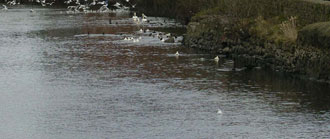CLIMATE change is predicted to increase the risk of flooding in Clare, and measures like dredging of rivers, cannot be seen as quick-fix solutions, members of the county council have been warned.
The topic was discussed in detail at the monthly local authority meeting on foot of a motion from Councillor Gabriel Keating. The Fine Gael member asked the council to engage with the relevant statutory authorities to dredge rivers “to prevent ongoing flooding of our lands in the interest of good environmental and farming practice”.
A response from the council, pledging to work with those agencies to ensure dredging can be carried out where it is appropriate and subject to a range of environmental considerations, was welcomed by Councillor Keating.
A number of members, including Councillors PJ Kelly and Pat Hayes noted that confusion tends to arise between the number of agencies involved in the management of waterways, as to who is responsible when there is a threat of flooding or a serious inundation.
“I have proposed a number of years ago that an inter-agency body be set up,” Councillor Hayes said. “There are several bodies involved including those responsible for fisheries, the ESB and the OPW. We cannot take action ourselves when other organisations are not at the table, so I’m asking again that we have a long-term plan, involving all of the agencies. We must remember that rivers are amenities also and need attention immediately, so I’d like to thank Councillor Keating for this motion.”
Councillor Gerry Flynn said he was supportive of the motion as it “makes a lot of sense”. Referring to the response from Senior Engineer Cyril Feeney, Councillor Flynn said that it “has shown a lot of integrity”. “It is not as simple as just dredging,” he said. “In my view, the OPW has failed to maintain the rivers and I would point the finger of blame at them.”
Agreeing that the council’s response to the motion was “very progressive,” Councillor Cillian Murphy said the authority had come a long way in terms of its thinking.
Speaking from his personal experience of having his own property flooded, Councillor John Crowe said the council had responded well to the problem in the Sixmilebridge area. “Two or three years ago, there was serious flooding, including at my own place,” he said. “A fantastic job was done with the help of the council. In the past, the river was dredged every year and there were never any problems. All rivers must be dredged to prevent serious flooding.”
Councillor Johnny Flynn told the meeting that he has raised the issue many times. “I support the motion, but with a qualification,” he said. “Dredging can have downstream flooding impacts. We do need to maintain rivers, however. The River Fergus Drainage Committee was disbanded and I’ve said a number of times that it should be back up and running.”
In his written response to the motion, Mr Feeney said it is important to acknowledge that climate change will cause “an increase in the frequency of extreme precipitation events which will result in an increased risk of flooding from rivers and rainfall”. The senior engineer cautioned that dredging is not always the solution. “Dredging can have unintended consequences,” he noted, “and can increase the flow and speed of rivers causing damage to properties, infrastructure and the economy in an area far removed from where the original dredging took place. It can also be detrimental to the river morphology, habitats and ecosystems.”
Mr Feeney also noted that flooding can be caused by interventions that create pinch points, including bridges, insufficiently-sized culverts or drainage pipes, or other developments. The reclamation of land for forestry and farming has also affected drainage, his response said.
The engineer’s reply pointed out the environmental considerations that had to be taken into account and the provisions of the Water Framework Directive, whose objectives are being met, in Ireland, through the River Basin Management Plan 2018-2021. “Therefore, a holistic approach must be undertaken prior to dredging any river to ensure we have a full understanding of the causes, consequences and environmental impacts such works may have on the communities of County Clare,” Mr Feeney’s response said.



